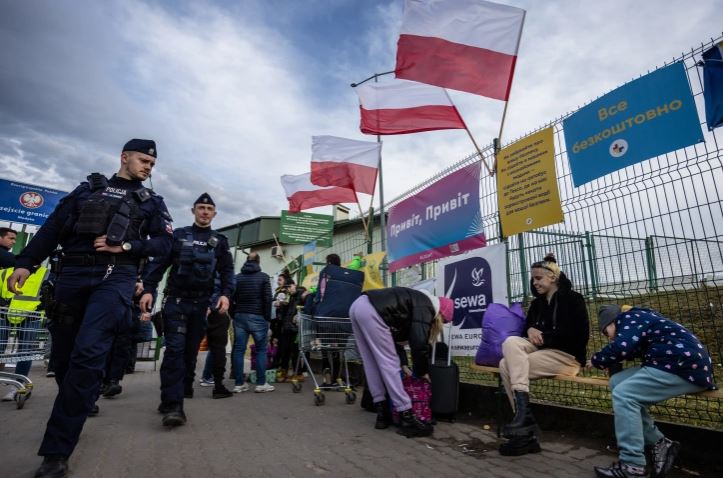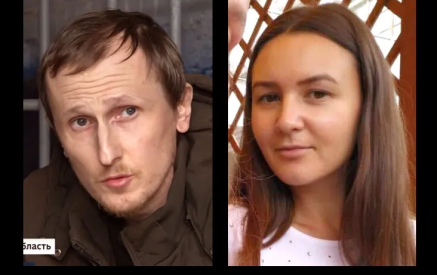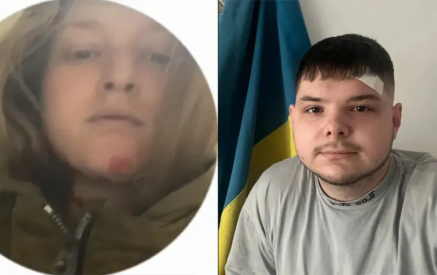On a recent April morning in Warsaw, Joanna Krawczyk was sitting inside a café in the city center, her phone pinging nonstop. The head of Wyborcza Foundation, a Polish media support initiative, Krawczyk was fielding messages from colleagues coordinating the passage of a truckload of reporting equipment from Poland to Ukraine.
“It’s like a rotating menu in a restaurant,” she told CPJ of the group’s donations to match the quickly evolving needs of Ukrainian journalists. Since Russia’s invasion of on February 24, the foundation has been part of efforts to send bullet-proof vests, first aid kits, technical gear, and more to Ukrainian journalists so they can continue to tell the story of the war.
The Wyborcza Foundation is one of several Polish initiatives to help the Ukrainian press. In interviews with CPJ, Polish journalists said they feel a special responsibility to their Ukrainian counterparts, mirroring Polish generosity toward Ukrainians since the outset of the war. Poland, which has deep, if complicated ties with Ukraine and a historic mistrust of Russia, has taken in more than three million Ukrainian refugees, according to the United Nations. However, many Ukrainian journalists, CPJ has learned, have chosen to remain in the country out of a sense of professional and national duty.
Read also
“Very quickly, the basic needs for journalists working in small towns and regions in southern and eastern Ukraine became apparent,” said Ostep Protsyk, co-founder of Lviv Media Forum, a regional media conference helping to facilitate aid, including from Poland, to Ukrainian journalists. Some journalists, he noted, have been displaced internally, “arriving to western Ukraine with no money or personal belongings.”
Ukrainian journalists who have fled to Poland often rely on informal networks, indicative of the close ties between the reporting communities in the countries. Journalist Halina Khalymonyk left her home in the southwestern city of Bilyaivka, located between Odesa and Moldova’s breakaway region of Trans-Dniester, in March. The editor-in-chief of local newspaper Bilyaivka.city, Khalymonyk said that it had become impossible to put out a print edition after her typesetter enlisted in the Ukrainian army. That, plus the fact that Bilyaivka was growing increasingly dangerous, prompted her decision to flee.
“This is why I left,” said Khalymonyk in an email, referring to an attached photograph of her daughter hiding in their basement in Bilyaivka. “No child should experience what my [child] went through in a few weeks — sitting in a cold basement, fear of death, sleeping in a bomb shelter.”
Her friend Darek Kortko, a reporter at Polish newspaper Gazeta Wyborcza, helped her find an apartment in Katowice, in southern Poland. There, Khalymonyk has continued to publish news about how the war is affecting Bilyaivka on Bilyaivka.city, made possible with more reliable internet access, and has also began writing weekly articles for Gazeta Wyborcza about Ukrainian refugees’ experiences in Poland.
In addition to the informal networks, organized efforts have sprung up to help those who have fled. Fundacja Reporterów (Reporters Foundation), a Polish investigative journalism organization, opened a hotline on February 26 to cater to Ukrainian colleagues in need of logistical help getting out of the country. The group also created a database of accommodations around Poland for journalists and other civil society members.
Sitting in the sparsely decorated Warsaw offices of Fundacja Reporterów, the organization’s co-founder and president, Wojciech Ciesla, showed CPJ the Slack platform where colleagues from media outlets like Gazeta Wyborcza and media trade groups such as Press Club Polska share housing opportunities for Ukrainian refugee journalists.
In the next room, the sofa bed was still made from the previous evening when the foundation hosted a Ukrainian journalist and her family. They had left a few hours prior, setting off to stay with an acquaintance, said Ciesla. A few bags of donated clothing and toys lined the floor, just in case the next family needed anything.
Around the corner from Fundacja Reporterów is a registration center for newly arrived Ukrainian refugees. The war, Ciesla emphasized, is an inescapable reality in Poland.
While Ciesla has been heartened to see the outpouring of help for Ukrainians — journalists and other civilians alike — he said that Polish humanitarian efforts are driven by a deeper existentialist concern about the Kremlin’s reach. There’s a Polish saying, Cielsa said, “If you live in Poland, you never smile at the circus” — meaning that the bear, Russia, could lunge toward you at any moment.
Cognizant of the need to address the growing population of Ukrainians within Poland, some of the country’s radio and television outlets have begun running Ukrainian-language programs with brief news bulletins and information about resources available to refugees.
And in at least one case, refugees started their own outlet. UA24.tv, a Ukrainian-language online television channel based in Warsaw, has provided information for Ukrainians adapting to life in Poland since its launch in mid-April.
The channel’s origins predate the war; Sebastian Mikołajczak, a producer in Poland’s entertainment sector, had long been trying to convince his colleague, Ukrainian entertainment producer Igor Tarnopolski, to create a channel for the Ukrainian diaspora in Poland.
On the eve of the Russian invasion, Mikołajczak floated the idea again to Tarnopolski, trying to persuade him to leave Ukraine for his safety. Several days later, Tarnopolski fled to Poland with his family and the project gained steam. (As a father of three, Tarnopolski was exempt from Ukraine’s rule prohibiting men ages 18 to 60 from leaving the country.)
UA24.tv is funded by Polish state-controlled businesses, but Tarnopolski said that he is keen to find a longer-term funding solution that will allow the channel to maintain editorial independence. In an interview with CPJ before the launch, he said the programming will be aimed at helping Ukrainians adapt to their new lives in Poland, but also provide a respite from the war with entertainment.
“It’s essential that we don’t forget about the war,” he said. “But it’s also of the utmost importance that we don’t forget about our life before and imagine what it will be like after.”
Committee to Protect Journalists























































